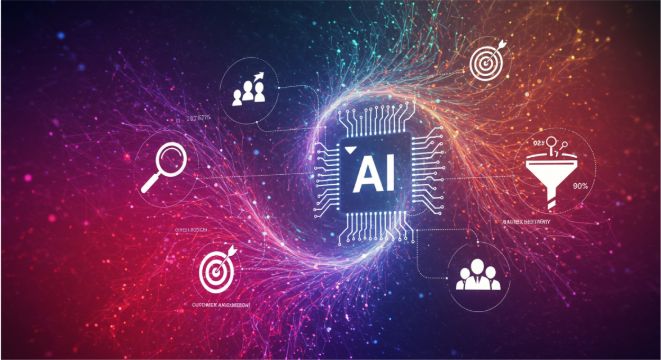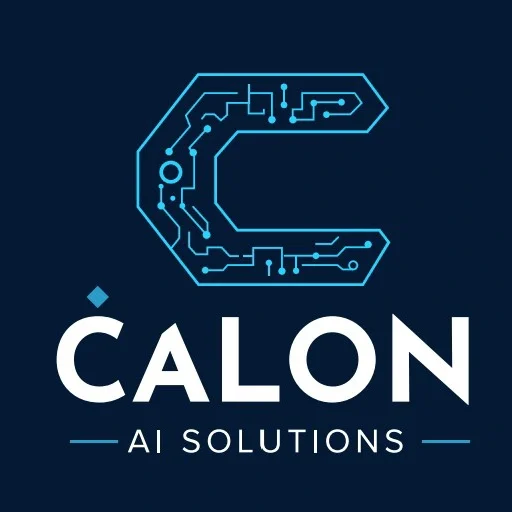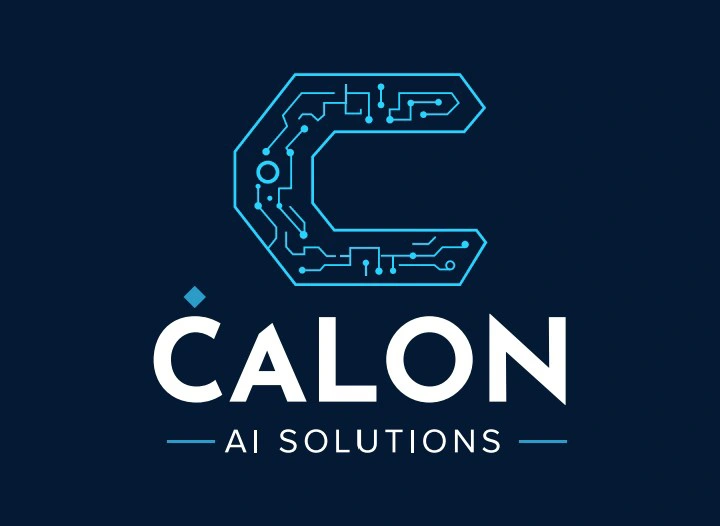AI in E-Commerce: Transforming Online Business 2025 with Innovations and Future Trends
The world of e-commerce is an ongoing shipment , with AI in e-commerce innovation at the forefront of this revelation. Artificial Intelligence (AI) is no longer a basic concept; it is the first priority for any business tool showing how businesses operate, interact with customers, and achieve strategic growth. As we going to 2025, the adoption of AI-powered business solutions is booming, enabling companies to streamline operations, enhance customer experiences, and scale with unprecedented efficiency.
The numbers volumes about this revolution. The global AI market is projected to reach $126 billion by 2025, showcasing the rapid integration of AI across industries. Additionally, 91.5% of leading businesses already start invested in AI tools, underlining the critical role of AI in driving business transformation and maintaining a competitive edge and make business smother.(Source: Forbes).

From personalising customer journeys and optimising inventory management predict consumer behaviour, e-commerce business optimisation with AI is open new levels of operational excellence. AI empowers businesses to make data driven decisions, automate complex processes, and deliver tailored experiences that resonate with customers. As e-commerce continues growing the market , AI is not just an asisitant but a necessity for businesses looking to stay in first in a fast paced digital economy. This blog explores the transformative impact of AI across various facets of e-commerce, highlighting how businesses can its potential to innovate and grow. Whether through scalable solutions, advanced analytics, or immersive shopping experiences, AI is position to shape the future of e-commerce in profound ways.
AI in E-Commerce Innovation and Transformation
Artificial Intelligence (AI) is restructuring e-commerce, driving innovation, and enabling businesses to scale dramatically . By 2025, it is expected that 70% of e-commerce businesses will adopt AI to boost their operational efficiency, underscoring its pivotal role in the industry’s transformation. AI in e-commerce innovation is no longer a future concept but a present necessity that is reshaping digital commerce growth.
AI for Scalable E-Commerce Solutions
AI has proven to be a game-changer for creating scalable e-commerce solutions, catering to both small businesses and large enterprises. For smaller e-commerce players, AI-powered platforms offer tools for automating repetitive tasks, such as inventory management and customer support, at a fraction of traditional costs. This enables small businesses to operate efficiently while focusing on growth. For larger enterprises, AI provides the capability to handle immense data that they have, enabling real-time insights into customer behaviours and sentiment analysis and market trends. These insights drive strategies for optimising e-commerce business operations, ensuring resources are allocated effectively, and enhancing profitability.
Case in Point: AI-driven demand forecasting tools are increasing and business , helping e-
commerce businesses of all sizes predict inventory needs with remarkable accuracy, reducing overstocking or under-stocking risks and maintain their consistence . This scalability not only
streamlines operations but also ensures a seamless customer experience.
AI-Enhanced Digital Storefronts
AI-powered digital storefronts are transforming the businesses operation with their customers. Through features like personalised recommendations, dynamic product displays, and automated customer support, businesses can create a highly engaging and user-friendly shopping experience by using AI. AI in digital commerce growth enables storefronts to adapt dynamically to customer preferences. For example, AI algorithms can analyse browsing and purchase history to offer personalised product suggestions in real time and offer price dynamic , This level of personalisation enhances customer satisfaction and drives repeat purchases. Additionally, AI-enhanced storefronts simplify backend operations. Integration of AI into platforms allows for automation of tasks such as product categorisation and content generation. By reducing manual workload, businesses can redirect efforts toward strategic initiatives, further optimising operations make faster their work .
Example: AI-powered tools like Shopify’s virtual assistant help e-commerce businesses design storefronts that cater to unique customer needs while automating updates and content modifications.
Business Transformation with AI
AI is at the core of business transformation in e-commerce. By automating very complex
processes, businesses can achieve new levels of efficiency and agility and grow their business. Predictive analytics, for instance, equips businesses with the ability to anticipate market demands, enabling them to adapt proactively. This is particularly critical for navigating the fast- paced nature of digital commerce growth.
Moreover, AI-driven solutions like chatbots and virtual assistants ensure 24/7 customer support make 10X enhancing user satisfaction. For example, an AI-powered chatbot can handle thousands of customer queries in a minutes , providing accurate and timely responses, which would be impossible for human teams to achieve at scale.
AI also facilitates integration across multiple e-commerce platforms, streamlining operations for businesses managing diverse sales channels. Unified data collection and analysis empower companies to make data-driven decisions, maximising the potential of every channel.
The Numbers Speak
The adoption of AI in e-commerce innovation is accelerating rapidly:
-70% of e-commerce businesses are expected to use AI for operational efficiency by 2025.
-Companies leveraging AI in digital storefronts report a 30% increase in customer engagement and satisfactions
-Predictive analytics powered by AI reduces operational costs by up to 20% (Source: Deloitte).
AI’s role in e-commerce innovation and transformation is both extensive and impactful. From
creating scalable solutions for businesses of all sizes to revolutionising digital storefronts and enabling seamless platform integration, AI is paving the way for unprecedented growth. As the industry moves forward, adopting AI will no longer be optional—it will be a competitive necessity. E-commerce businesses must embrace these advancements to thrive in the dynamic landscape of digital commerce growth.

Personalisation in E-Commerce
Personalisation has become a cornerstone of modern e-commerce Business , with Artificial
Intelligence (AI) playing a pivotal role in delivering personalised retail experiences. In an era where consumers demand tailored interactions, AI has emerged as the key enabler of customer-centric marketing, reshaping how businesses connect with their customers.
Personalised Virtual Shopping Assistants
AI-driven virtual shopping assistants are revolutionising e-commerce by catering to individual customer preferences. These assistants use advanced algorithms to understand user behaviour, preferences, and purchase history. By doing so, they provide personalised recommendations for seals more , streamline product searches, and even assist in making purchase decisions. This level of customisation not only enhances the shopping experience but also builds stronger customer relationships.

For example, a virtual assistant might suggest complementary products based on a shopper’s cart items or offer targeted discounts tailored to their purchase history. Such features create a seamless and satisfying user journey, encouraging repeat visits and loyalty.
AI-Powered Recommendation Engines
AI-powered recommendation engines are a powerful tool for boosting conversion rates in e-
commerce. These engines analyse vast amounts of data, including browsing patterns and
previous purchases, to suggest products that align with the customer’s interests. By offering
relevant and timely suggestions, businesses can significantly enhance their sales performance.
Case in Point: Retail giant Amazon attributes up to 35% of its revenue to its recommendation engine, which is driven by sophisticated AI algorithms. This demonstrates how personalised recommendations can directly impact profitability.
AI for Improving Website User Journeys
AI also plays a critical role in optimising website user journeys by helping show what they are looking for . By analysing customer behaviour, AI identifies pain points and opportunities for
improvement. For instance, AI might detect that users frequently abandon their carts at a specific stage of the checkout process and recommend adjustments to streamline the experience. This level of insight ensures that businesses can create intuitive and user-friendly interfaces.
Predictive Customer Support
Predictive customer support, powered by AI, further enhances personalisation by anticipating customer needs before they arise. For example, AI can analyse user behaviour to predict common queries or issues and proactively.
The Numbers Speak
The impact of personalisation in e-commerce is undeniable:
-80% of customers prefer personalised experiences, as reported by Epsilon.
-Personalised recommendations drive up to 30% higher sales conversions. AI’s ability to deliver personalised retail experiences is transforming e-commerce, making it more
customer-centric . From virtual shopping assistants to AI-powered recommendation and
predictive customer support, these innovations enhance every aspect of the shopping journey and drive more sells . As businesses rising consumer expectations, adopting AI for personalisation is no longer optional it’s essential for staying competitive and drive more sells.
AI for Customer Experience
In e-commerce, customer experience is a key differentiator, and Artificial Intelligence (AI) is
revolutionising how businesses engage with their customers. By leveraging AI-powered virtual shopping assistants, AI-driven customer touchpoints, and advanced shopping cart abandonment solutions, businesses can create seamless, personalised, and engaging shopping experiences that drive loyalty and revenue.
Optimising Customer Touchpoints with AI
AI-driven customer touchpoints are transforming the way businesses interact with shoppers. AI can identify where customers engage most during their journey, analyse their behaviour, and provide tailored solutions to enhance these interactions. From personalised product
recommendations to instant responses via chatbots, AI ensures that each touchpoint is optimised to meet customer needs. For example, AI-powered tools can predict a customer’s intent to purchase based on browsing patterns and provide real-time incentives, such as discounts or free shipping offers, at critical moments. This approach not only improves the shopping experience but also boosts conversion rates.
AI-Powered Product Customisation
AI-powered product customisation is taking customer experience to the next level by allowing shoppers to personalise products according to their preferences and their act on website . From choosing colours and designs to customising product features, AI enables businesses to offer unique, tailored options that resonate with individual customers. This trend is particularly evident in sectors like fashion and home decor, where personalisation plays a significant role in purchasing decisions.
Reducing Shopping Cart Abandonment
Shopping cart abandonment remains one of the biggest challenges in e-commerce, with businesses losing a staggering $4.6 trillion annually due to this issue (Source: Business Insider). AI offers powerful solutions to tackle this problem by identifying the reasons behind abandonment and taking proactive measures. For instance, AI-powered shopping cart abandonment solutions can send personalised email reminders or push notifications to customers who leave items in their carts. Additionally, AI can analyse user behaviour to offer discounts or alternative payment options to encourage checkout completion.
AI-Powered Virtual Shopping Assistants
Virtual shopping assistants, powered by AI, further enhance customer experience by providing real-time assistance and posting their customer servicess . These assistants can answer queries, recommend products, and guide users through the purchasing process, mimicking the experience of in-store shopping. Their ability to engage customers 24/7 ensures that businesses never miss an opportunity to delight shoppers.
The Numbers Speak
• Businesses lose $4.6 trillion annually due to abandoned carts, a challenge that AI can
significantly address.
• Personalised interactions powered by AI improve customer satisfaction by up to 20%.

AI’s role in enhancing customer experience is transformative. By optimising customer
touchpoints, enabling product customisation, and reducing shopping cart abandonment, AI
empowers businesses to meet and exceed customer expectations. As the e-commerce
landscape becomes increasingly competitive, adopting AI-powered solutions will be vital for
delivering exceptional experiences that drive growth and loyalty.
AI for Marketing
Marketing strategies in e-commerce are growing very fast , with Artificial Intelligence (AI) driving new levels of precision and effectiveness. Through predictive marketing with AI, AI-powered ad targeting, and AI-driven brand analytics, businesses can craft highly targeted campaigns that resonate with their audience and deliver measurable results.

Predictive Marketing for Targeted Campaigns
Predictive marketing with AI leverages advanced algorithms help us to analyse customer data and forecast future behaviours. By identifying patterns in browsing, purchasing, and engagement history, AI enables marketers to anticipate customer needs and create personalised campaigns that target the right audience at the right time. For instance, an AI-powered system can determine the optimal time to send promotional emails based on a customer’s past interactions. It can also predict which products are most likely to interest individual customers, enabling highly relevant recommendations. These insights help businesses increase customer engagement and drive conversions.
AI-Powered Ad Targeting
AI-powered ad targeting ensures that marketing budgets are spent where it’s needed by reaching the most relevant audiences. AI analyses factors like demographics, online behaviours, and location data to deliver ads to those most likely to convert. This precision targeting minimises wasted spend and maximises ROI.
Platforms like Google Ads and Facebook Ads already use AI to optimise ad placement and
bidding strategies see the result . These tools continuously learn and adapt, ensuring that
campaigns stay effective in real time.
Example: An e-commerce retailer selling fitness apparel can use AI to target customers who have recently searched for gym equipment or fitness routines, increasing the likelihood of a successful ad click.
AI-Driven Brand Analytics
AI-driven brand analytics empower marketers to track the performance of their campaigns and understand consumer trends. By processing vast amounts of data from multiple channels, AI provides actionable insights into what’s working and what needs improvement.
For example, AI can identify which social media posts generate the most engagement or
determine the impact of influencer collaborations on brand visibility. This level of analysis allows businesses to refine their strategies and make data-driven decisions to boost marketing effectiveness.
AI-Powered Content Marketing Tools
AI-powered content marketing tools streamline the creation and distribution of marketing
materials. From generating engaging blog posts to automating social media updates, these tools reduce the workload for marketers while maintaining high-quality output. AI can even analyse audience responses to optimise content for better performance.
The Numbers Speak
• Companies using AI for marketing report a 20% increase in efficiency where they really
need (Source: Salesforce).
• Predictive analytics improve campaign ROI by up to 30%, according to industry news AI is revolutionising marketing by providing powerful tools for predict targeting where can be best output can we get , ad optimisation, and data-driven analytics. With AI-powered ad targeting, content creation, and trend tracking, businesses can achieve unprecedented efficiency and ROI. As competition in e-commerce intensifies, leveraging AI for marketing strategies will be essential for staying ahead and delivering impactful campaigns.
AI in Sales Automation
Sales automation has become a crucial aspect of modern e-commerce, and AI-driven sales
automation is transforming how businesses manage and increasing and optimise their sales
processes. By leveraging AI-powered upselling strategies and get most out of it , automated
responses, and real-time customer service AI, businesses can enhance efficiency, boost
conversion rates, and deliver exceptional customer experiences.

AI for Cross-Selling and Upselling Strategies
AI-powered upselling strategies use data-driven insights to recommend complementary or higher- value products to customers. By analysing purchase history, browsing behaviour, and preferences, AI identifies opportunities to encourage additional purchases. Similarly, cross-selling strategies powered by AI present customers with related products that match their interests, increasing the order and volume of sells.
Example: When a customer purchases a smartphone, an AI system might recommend
accessories like cases, screen protectors, or earbuds, increasing the likelihood of additional sales.
Real-Time AI Customer Engagement Across Channels
Real-time customer service AI enables businesses to engage with customers instantly, regardless of the platform or channel. AI-powered chatbots and virtual assistants provide instant responses to queries, guide users through the sales process, and even assist with troubleshooting. This seamless, multi-channel engagement keeps customers satisfied while freeing up human resources for more complex tasks.
The Numbers Speak
• Sales automation powered by AI increases lead conversion rates by 35% (Source:
McKinsey).
• Businesses that implement AI-driven sales processes report a 20% reduction in sales cycle time.

AI in sales automation is revolutionising how businesses approach upselling, cross-selling, and customer engagement. By harnessing AI-powered tools, e-commerce businesses can optimise their sales funnels, enhance customer satisfaction, and achieve measurable growth. In a competitive market, adopting AI for sales automation is no longer optional—it’s essential for staying ahead.
AI for Business Intelligence and Analytics
Artificial Intelligence (AI) is revolutionising business intelligence, providing organisations with the tools to make smarter, data-driven decisions. By harnessing business intelligence with AI,
companies can gain real-time insights, automate complex analyses, and refine their strategies for long-term success. AI for business analytics and reporting is not only streamlining operations but also enabling leaders to act with precision and foresight.

AI for Real-Time Analytics and Actionable Insights
AI-powered tools are capable of processing massive datasets in real time, delivering actionable insights that would take human analysts days or even weeks to uncover. These systems identify patterns, trends, and anomalies in data, allowing businesses to respond swiftly to changing market conditions or customer behaviours.
For instance, AI can monitor website traffic, sales data, and customer interactions to identify
underperforming products or regions. Businesses can then adjust their marketing strategies or inventory levels accordingly, ensuring optimal performance.
Example: A retail company using AI for real-time analytics might discover that certain products sell better during specific timeframes, enabling targeted promotions that maximise sales.
AI-Based Business Forecasting Tools
AI-based business forecasting tools take predictive analytics to a new level. By analysing
historical data and external factors, such as economic trends or weather patterns ,time , AI can accurately forecast sales, demand, and revenue. This level of forecasting enables businesses to optimise inventory, allocate resources effectively, and minimise risks.
For example, an e-commerce platform can use AI forecasting to prepare for seasonal demand spikes, ensuring that popular items are well-stocked while avoiding overproduction of less in-demand products.
The Numbers Speak
•78% of executives believe AI enhances decision-making by providing faster and more accurate insights (Source: PwC).
•Companies leveraging AI for business analytics report a 25% reduction in operational costs.
AI for Business Strategy and Automated Insights
AI for business strategy helps organisations identify opportunities and challenges with
unparalleled precision. Automated business insights generated by AI reduce the reliance on
manual analysis, freeing up teams to focus on strategic planning. From customer segmentation to performance benchmarking, AI empowers businesses to stay ahead of the competition. AI driven business intelligence and analytics make transforming the way organisations operate, providing real-time analytics, predictive forecasting, and actionable insights. By integrating AI into business strategy and decision-making processes, companies can stay agile, make informed decisions, and thrive in an increasingly data-driven world. Embracing AI for business analytics is no longer an option—it’s a necessity for long-term success.
AI in Supply Chain Automation
Supply chain management is a critical aspect of e-commerce, and Artificial Intelligence (AI) is
transforming it into a more efficient and responsive process. With AI in warehouse automation, smart supply chain solutions, and AI-powered inventory optimisation, businesses can streamline operations and adapt to changing market demands seamlessly.
Smart Inventory Management and Demand-Supply Matching
AI-powered inventory optimisation allows businesses to manage their stock with unprecedented accuracy. By analysing sales trends, customer behaviour, and external factors like seasonal demand like summer time , winter time AI predicts inventory needs and ensures the right products are always available. This minimises overstocking and reduces the risk of stockout, leading to improved customer satisfaction and operational efficiency.
Smart supply chain solutions also enable real-time demand-supply matching. AI monitors market conditions and adjusts procurement and distribution strategies dynamically. For example, during a sudden surge in demand, AI systems can identify alternate suppliers or distribution routes to prevent delays, ensuring uninterrupted service.
Example: A fashion retailer can use AI in demand prediction to prepare for seasonal trends,
avoiding excess inventory of off-season products while ensuring top-sellers are in stock.
The Numbers Speak
AI-powered inventory optimisation reduces inventory costs by 20% and minimise their losing profite (Source: Deloitte).
Businesses using AI in warehouse automation report a 30% improvement in operational
efficiency.

AI in supply chain automation is redefining the way businesses manage logistics and inventory. With its ability to optimise inventory, predict demand and do something that make great , and implement smart supply chain solutions, AI helps e-commerce businesses stay agile and cost- effective. As competition intensifies, leveraging AI in supply chain management will be essential for achieving operational excellence and sustaining growth business.
AI in Fraud Prevention
Fraud is most significant concern for e-commerce businesses, costing the industry billions
annually. Artificial Intelligence (AI) is playing a crucial role in combating this issue, offering
advanced solutions for fraud detection, transaction security, and overall business security. By
leveraging AI for fraud detection in e-commerce help businesses can safeguard their operations and enhance customer trust.
Strengthening E-Commerce Transaction Security with AI
AI for protecting e-commerce transactions uses advanced algorithms to detect and prevent
fraudulent activities in real time. These systems analyse patterns in transaction data, identifying anomalies that may indicate fraud. For example, AI can flag suspicious activities like multiple failed login attempts, unusually large purchases, or mismatched shipping and billing addresses. The traditional rule-based systems is daed now, AI continually learns and adapts to new fraud techniques, ensuring that security measures remain effective against evolving threats. By identifying potential risks early, AI prevents fraudulent transactions before they occur, minimising financial losses and protecting sensitive customer data.
Business Security Beyond Transactions
Beyond transaction-level security, AI enhances overall business security by monitoring network activity and detecting potential breaches. This proactive approach ensures that businesses can address vulnerabilities before they are exploited.
The Numbers Speak
AI-based fraud detection systems reduce fraud costs by 42% (Source: Juniper Research).
Businesses using AI for fraud prevention report a 30% faster response time to security
threats.

AI is revolutionising fraud prevention in e-commerce by providing robust, adaptive, and proactive solutions. From safeguarding transactions to enhancing overall business security, AI empowers businesses to stay ahead of fraudsters. For e-commerce businesses aiming to protect their assets and build customer trust, investing in AI-driven fraud prevention is an indispensable strategy.
AI in Sustainability and Ethical E-Commerce
As consumer demand increasing to sustainable and ethical practices . Artificial Intelligence (AI) is helping e-commerce businesses meet these expectations. By enabling AI for sustainable supply chains, eco-friendly product recommendations, and ethical AI practices in e-commerce, businesses can align with consumer values and reduce their environmental impact.

AI-Driven Sustainability in Supply Chains
AI is transforming supply chains into more sustainable operations by optimising logistics, reducing waste, and minimising carbon footprints. Through advanced analytics, AI identifies inefficiencies in sourcing, production, and distribution, allowing businesses to make eco-conscious decisions. For instance, AI-powered demand forecasting ensures precise inventory management, reducing overproduction and the waste it generates.
Additionally, AI can optimise delivery routes to lower fuel consumption, contributing to a greener logistics process. Smart algorithms also enable businesses to source materials from environmentally responsible suppliers, ensuring that every step of the supply chain aligns with sustainability goals.
Eco-Friendly Product Recommendations
AI in eco-friendly product recommendations supports ethical consumerism by helping shoppers discover sustainable options. For example, an AI system can prioritise products made from recycled materials or highlight items from brands with verified green practices. This not only educates consumers about sustainable choices but also builds loyalty among eco-conscious buyers.
The Numbers Speak
62% of consumers prefer to buy from sustainable brands (Source: Nielsen).
Businesses adopting AI-driven sustainability practices report up to a 30% reduction in waste.

AI is a powerful and make sustainability and ethical practices in e-commerce. From creating
greener supply chains to promoting eco-friendly product choices, AI helps businesses meet
consumer expectations while reducing environmental impact. As sustainability becomes a
competitive advantage, leveraging AI for ethical practices is essential for future success.
Emerging AI Trends in E-Commerce
The rapid growth of Artificial Intelligence (AI) is shaping the future of e-commerce, introducing innovative technologies that redefine how consumers shop online. From generative AI for product descriptions to AI in AR/VR e-commerce integration and AI-driven digital payment solutions, these cutting-edge trends are paving the way for a more immersive and efficient e- commerce experience.

AI Integration with AR/VR for Immersive Shopping
AI combined with augmented reality (AR) and virtual reality (VR) is revolutionising the online
shopping experience by creating interactive, lifelike environments. Consumers can virtually “try on” clothes, view how furniture fits in their living spaces, or test products before making a purchase. AI enhances these experiences by tailoring them to individual preferences, analysing customer data to offer personalised AR/VR scenarios.
Example: A fashion retailer might use AI to recommend outfits based on a shopper’s style and allow them to see how the items look on a virtual model resembling their own body type.
Statistics: By 2025, 40% of consumers expect AR/VR shopping experiences to become
commonplace (Source: Gartner).
Generative AI for Automated Content Creation
Generative AI is transforming content creation in e-commerce by automating the production of product descriptions, marketing copy, and promotional content. These systems use natural language processing to craft engaging and informative descriptions tailored to specific products, saving businesses time and effort while maintaining high-quality standards. For example, an e-commerce platform can use generative AI to instantly create unique descriptions for thousands of new products, improving consistency and SEO performance.
AI-Driven Digital Payment Solutions
AI-driven digital payment solutions are enhancing the speed business , security, and convenience of online transactions. These systems use advanced fraud detection algorithms to secure payments while streamlining checkout processes. Features like AI-powered voice payments and biometric authentication are becoming increasingly popular, offering consumers fast and frictionless payment options. The Numbers Speak AR/VR shopping experiences are expected to reach $1.6 billion in market value by 2025. Generative AI reduces content creation time by up to 70%, increasing productivity for e-commerce businesses. Emerging AI trends like AR/VR integration, generative AI, and AI-driven payment solutions are reshaping the e commerce landscape. These innovations enhance user experiences, improve operational efficiency, and cater to evolving consumer expectations. As technology continues to advance, businesses that adopt these trends will gain a competitive edge in the dynamic world of online commerce.
AI in E-Commerce Beyond 2025
As we look beyond 2025, Artificial Intelligence (AI) is poised to drive even more profound
transformations in e-commerce. With advancements in autonomous AI in e-commerce and its role in shaping next-gen online marketplaces, businesses can expect a future where AI takes centre stage in redefining operations, customer experiences, and business models.
The Future of Autonomous AI in E-Commerce
Autonomous AI refers to systems help independently managing complex tasks without human needed , In the future, autonomous AI in e-commerce will streamline operations such as inventory management, logistics, and customer service. For example, fully autonomous warehouses could use AI-powered robots for stocking and shipping products, ensuring faster and more efficient deliveries. AI will also enable autonomous customer experiences, such as virtual shopping assistants that understand user preferences and make purchase decisions on their behalf. This could extend to subscription-based models where AI curates and delivers products tailored to customer needs, enhancing convenience and personalisation.

Conclusions
Artificial Intelligence (AI) is undeniably fasting the landscape of e-commerce, driving innovation, efficiency, and customer satisfaction. From enhancing customer experiences with personalisation and real-time engagement to streamlining supply chains and protecting transactions, AI is the cornerstone of business transformation. As businesses increasingly adopt AI to optimise operations and scale effectively, the potential for digital commerce growth becomes limitless. The future of e-commerce will be defined by cutting-edge advancements such as autonomous AI, immersive AR/VR integrations, and hyper-personalised customer interactions. These technologies not only meet evolving consumer expectations but also provide businesses with the tools to stay ahead in an ever-competitive market. Companies that fail to embrace AI risk falling behind, while those that do will gain a decisive edge in efficiency, customer loyalty, and profitability. Now is the time to act. The adoption of AI is no longer optional—it is essential for maintaining relevance and driving long-term growth in the dynamic e-commerce sector. At Calon AI Solutions, we specialise in helping businesses navigate the complexities of AI adoption. Whether you’re looking to enhance your customer experience, automate operations, or leverage predictive analytics for smarter decision-making, our tailored solutions are designed to meet your unique needs. Let us guide you on your journey to harnessing the full potential of AI. Take the next step toward transforming your e-commerce business. Contact Calon AI Solutions today and unlock the future of digital commerce.

